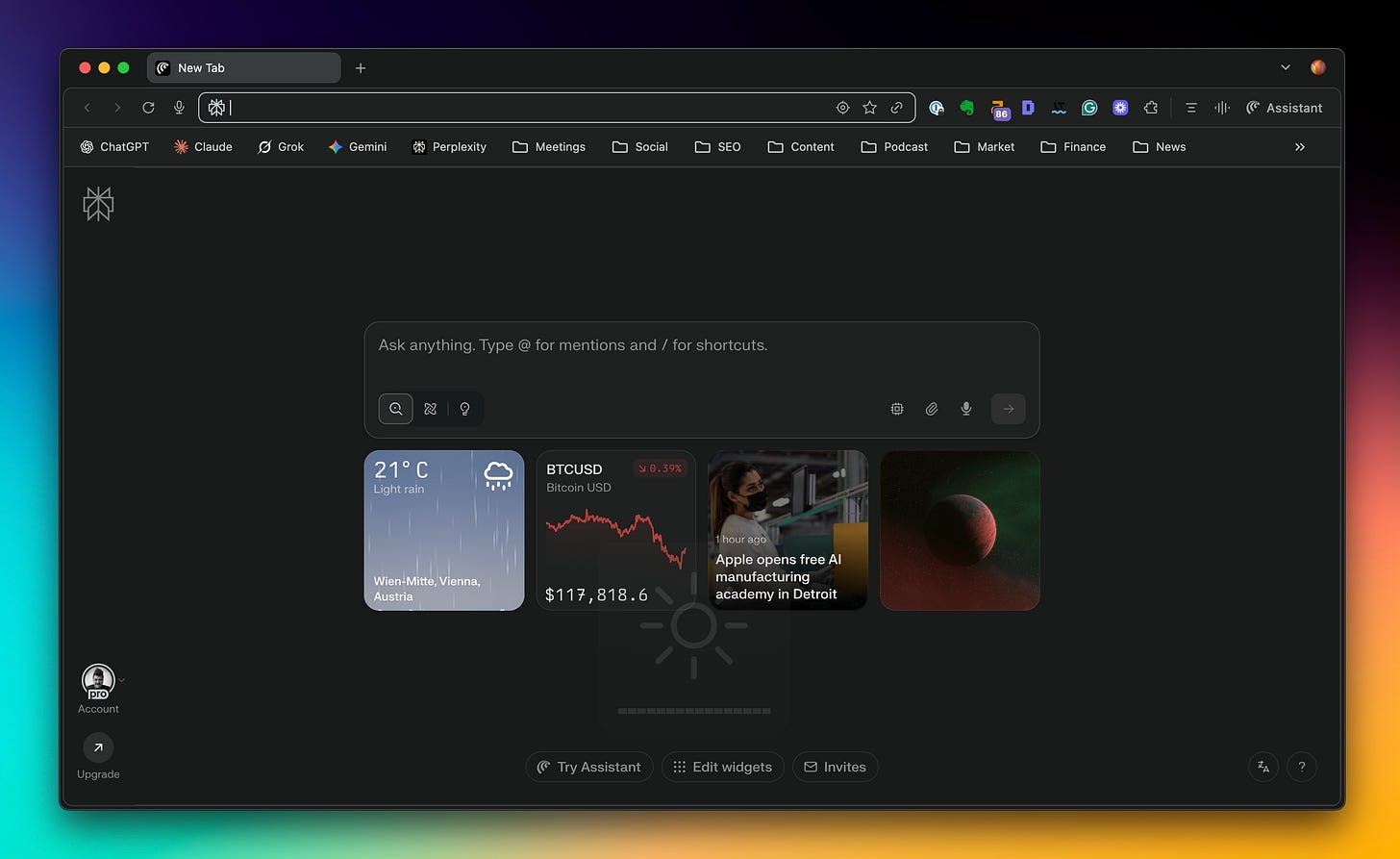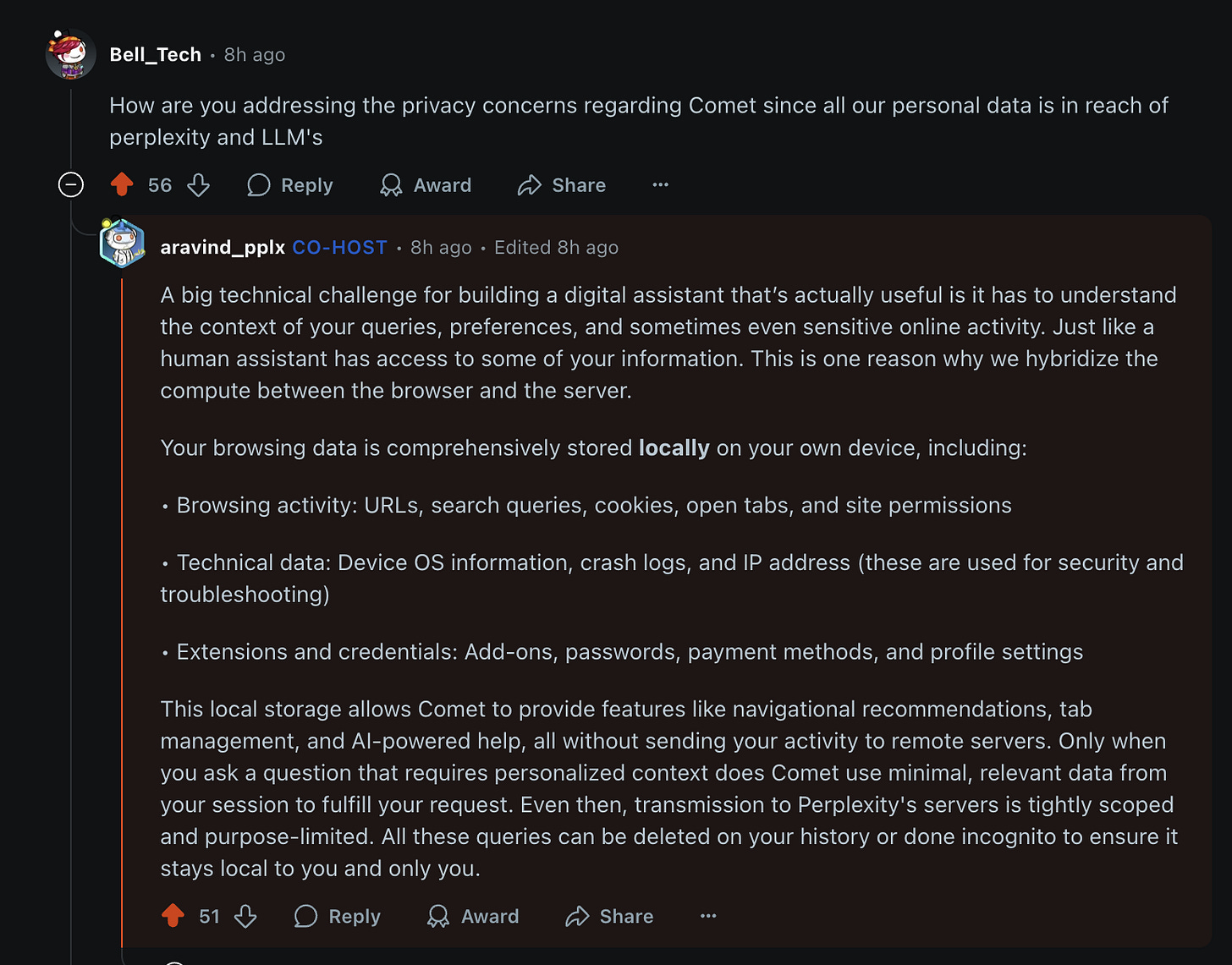Perplexity's Comet Browser: Hype or a New Baseline of How We Engage With AI and the Internet in the Future?
I’ve been using Perplexity’s new AI browser, Comet, for a few weeks now. This review shares my experiences with it, highlights the downsides we still face, and explores how Bitcoin can bridge this gap
Joël here! 👋
Look, I'll just say it outright: I've gone full AI convert.
Sure, the techno-optimist in me was always going to lean this way. But here's the real kicker – this technology actually makes me more productive.
No fluff, no grand promises about changing humanity. Just pure efficiency gains in my day-to-day.
AI has its upsides and downsides, obviously. But when you can browse the web with AI baked right into your browser, that’s awesome. Right?!
I've been a hardcore Perplexity user for over a year now. So when they dropped their Comet browser, jumping in and testing it was a no-brainer.
What you're about to read is my honest take on whether this browser is genuinely shifting how we interact with the Internet, or if it's just another shiny object in the endless tech hype cycle.
Time to find out!
My Experience With Comet So Far
Before Comet, I had already been using the Dia browser, about which I wrote in this piece.
So, I was used to having an AI-native browser in my dock, and I knew what the main features were. If I have to break them down simply, I would say:
Instead of having Google, you interact with an AI chatbot.
You can customize specific actions for a better browsing experience.
Open tabs, your history, and documents are interactable with your AI companion.
At least that’s what I thought until I downloaded Comet and started using it daily.
Source: Me
As you can see in the screenshot above, the browser is very similar to any Chromium-based experience you may have had in the past.
With one click, you were able to import your bookmarks (incredibly important for me), cookies, and history. Setting it up is pretty straightforward.
You can also customize your start page, which I filled with the current weather, the Bitcoin price in U.S. dollars (duh), the latest news from Perplexity’s aggregator, and a Zen tab for quick breaks between work.
Once you actually have everything set up, you can start browsing the web. And this is where Comet is better than Dia.
If you don’t specify alternative search engines in your settings, you will default back to Perplexity as the main engine.
Which is nothing to worry about if you like AI-based search results, but I was super frustrated the first couple of days, as I would enter a website, wait for the first few letters to load, and hit enter.
Typically, with any other browser that already has access to your history, once you type the first few letters, autocomplete kicks in and finds the website for you.
Source: Me
That is not the case with Comet! I can’t tell you how often I was looking for ‘Yout’ or ‘Link’ as search results in Perplexity.
It got better, the more I used Comet, but at first it was definitely frustrating.
Once that was settled, I started exploring the AI assistant features more. Just like Dia, there is a tab on the right to engage with the chatbot.
And what shall I say? It’s more or less the same as with any AI bot these days. You can ask it questions, use the content on the page as a source to gather more information, and learn more with a few prompts.
The real kicker, though, is Comet’s agentic mode, which allows you to automate specific browser actions and pull together multiple tabs or history items for your prompts.
Source: Me
As you can see in the recording above, I was able to instruct the assistant to check my Amazon account by going there, getting my latest order, and giving me the tracking details.
While this is still a very primitive feature set, it has the potential to be automated. There is even a feature to write emails and reply to them directly from the assistant.
Source: YouTube
I’ve not yet done that, and probably never will, but I already used the assistant to book meetings or to use Google Docs as a reference for my prompt and research. However, there are already reviews online like the one above from Stephen Robles, that go in depth about the capabilities of these agentic modes.
Generally speaking, I would love to see more agentic skills or recurring prompts I can customize. This is one of the advantages Dia has over Comet, in my opinion.
Lastly, I was also impressed by Comet’s speed and the overall user interface. Yes, it’s a Chromium browser, but the functionalities are there, and all the shortcuts you’re used to are still working perfectly.
The Elephant in the Room: Privacy
Speaking of things that need to improve, there is one giant elephant in the room: Privacy!
Source: Reddit
As you can see, I’m not the only one who’s concerned with this. Perplexity’s CEO, Aravind Srinivas, was available for a Reddit AMA and replied to most of the comments.
According to him, they’re not saving browsing data to improve the model and to have the assistant understand context between browsers.
However, I wonder how much of that data is actually transmitted to Perplexity via additional data points when you communicated with the LLM.
After all, they need to use that context to tell the model what to look for. Even if the data is encrypted, it still contains valuable information.
He even mentions this in the reply above, where he explains how data is only sent to their servers to get more context and look for additional sources to get an answer.
Source: YouTube
It’s not just me saying this, but there have also been privacy advocates who went a little deeper. I would encourage you to watch the video above to find out what I mean.
In short, numerous concerning data points in Perlexity’s terms of service suggest extensive data collection from sessions to extensions and personal data.
Unfortunately, this is a growing concern within the AI community, especially if you like to run local LLMs to preserve your privacy.
However, I’m optimistic that we will see browser forks that enable you to integrate a local LLM, thereby bypassing these restrictions and data collection.
For now, I would say that if you want a privacy-conscious browser, any AI browser is not your best choice. And if you decide to use one, only share what you want to be publicly available about yourself.
Where Bitcoin Could Fit In
I couldn’t write a blog without mentioning Bitcoin at least once.
My Comet experience has been very positive so far. Sure, there are a few things that need improvement, and the agentic features will develop over time.
However, what I really miss is the ability to engage with content online and reward people directly. It’s a tale as old as time for digital publishing.
Everyone can start a blog or write something up, but getting paid for this is another issue. This is where the native currency of the Internet comes in with Bitcoin.
Rather than relying on outdated technologies like credit cards, which come with significant background costs, we could utilize Bitcoin’s infrastructure.
AI agents will soon be able to chat and engage with other agents. It’s just a matter of time. Money on the base layer is a form of communication.
After all, you exchange information in the form of a monetary asset and get something in return, whether that’s information, a service, or simply a tip for your article online.
AI can’t solve this problem because its information is unreliable and requires more data to become smarter. One way to highlight good information is by offering a monetary incentive.
This is where Bitcoin can complete any AI browser. Suppose I can connect my Bitcoin wallet, or even my Lightning node, to one of these agents. In that case, I can have sovereignty over the way I feed premium information to that agent.
It’s definitely a long shot, but if someone in the AI field can integrate this, I don’t need to worry about too strong biases (after all, there is always a bias in any LLM) anymore.
Rather than relying on a centralized entity in the LLM with remote servers somewhere, I could use decentralized money with BTC as the base layer to maintain informational sovereignty.
Or, maybe we’ll see an AI browser soon, where I could even hook up to a local LLM on my machine and use both the AI and Bitcoin layer fully decentralized.
If we can close that gap, there is nothing to stop us from becoming single entities in a vast sea of information and content.
Kinda ironic, isn’t it? That’s the whole idea behind the Internet…






Proper blog Joel. The LLMs are getting better, agenetic support further behind, but improving. Now the question is which do you trust with your data as you aptly ask.
On that matter, I am starting to migrate away from Chat GPT given Sam’s history with the ‘orb’ and subsequent interviews.
AI is getting better because we are training the animal. But for what ultimate use?